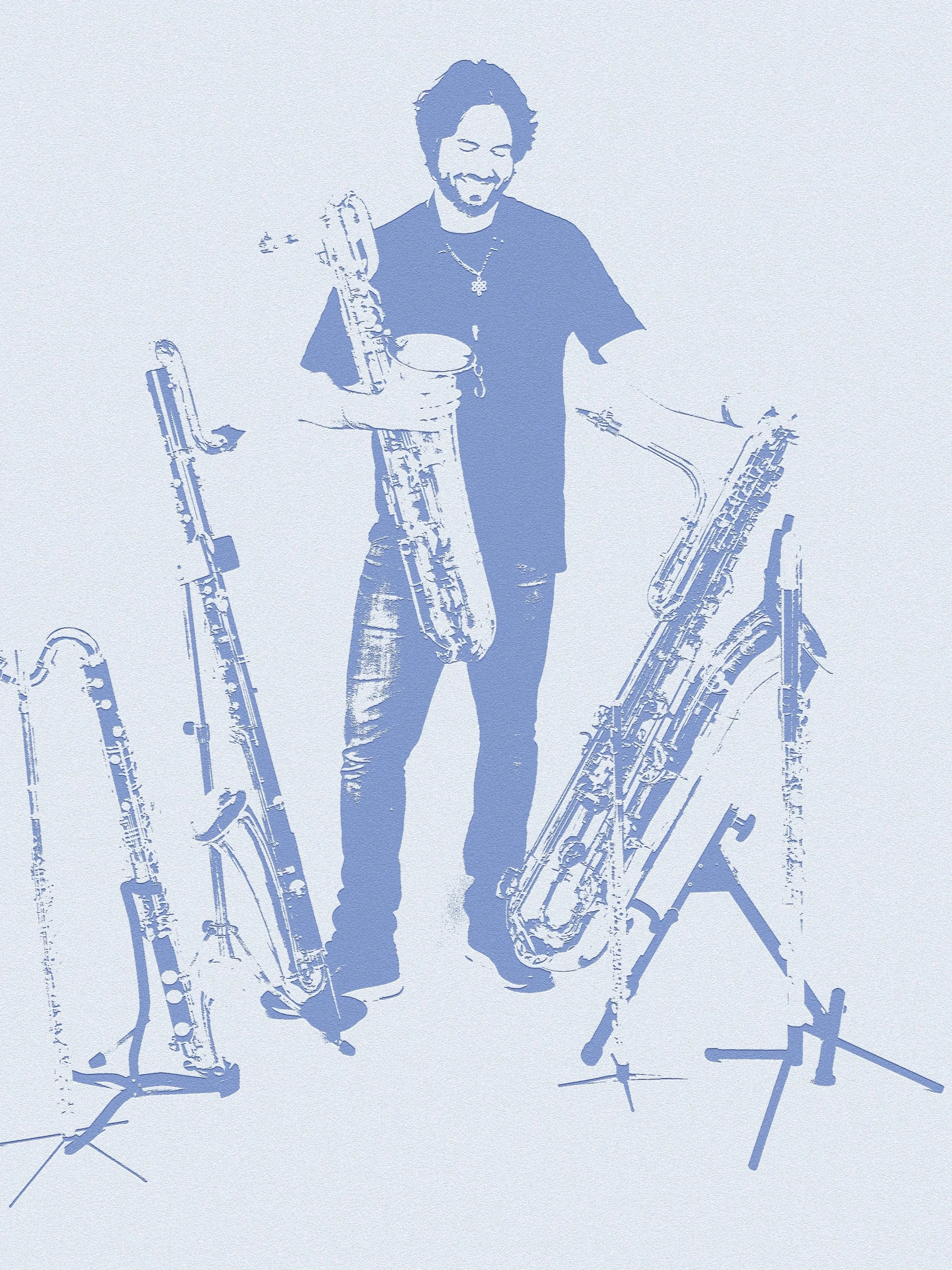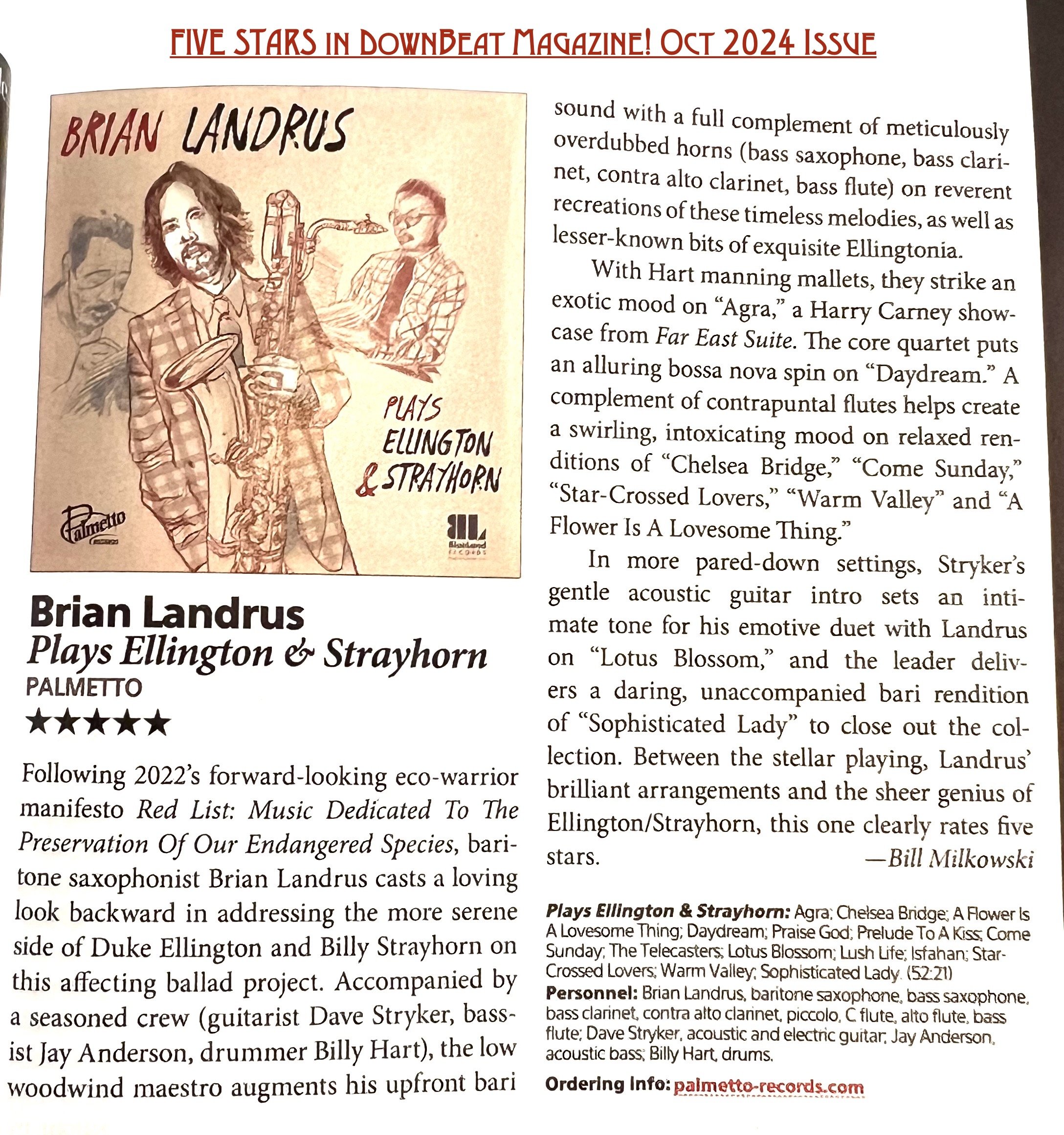“Mr. Landrus takes the jazz big band tradition into the mesosphere.”-The New York Times.
NEW ALBUM RELEASED JULY 12, 2024 on Palmetto Records!! Click here to order a download or CD now!
Brian Landrus Plays Ellington & Strayhorn features Dave Stryker on guitar, Jay Anderson on bass, and NEA Jazz Master Billy Hart on drums.
Landrus arranged the Ellington and Strayhorn compositions by using the rhythm section above with Landrus on baritone saxophone, and then overdubbing multiple flutes, alto flutes, bass flutes, bass clarinets, contra alto clarinets, and bass saxophones to create a woodwind orchestra.
Links to entire Brian Landrus Plays Ellington & Strayhorn here
Links to the single “Chelsea Bridge” here
Links to the single “Daydream” here
Links to buy Brian Landrus Plays Ellington & Strayhorn downloads & CDs here
_______________________________________________________________________________________________________________________________________________________________
NEWS RELEASE ABOUT BRIAN LANDRUS PLAYS ELLINGTON & STRAYHORN
Contact: Ann Braithwaite
(781) 259-9600
Brian Landrus translates the music of Duke Ellington and Billy Strayhorn into the language of low woodwinds on his stunning new album
Brian Landrus Plays Ellington & Strayhorn, due out July 12, 2024 via Palmetto Records, features Dave Stryker, Jay Anderson, Billy Hart and a rich array of saxes, clarinets and flutes played by Landrus
“The low reeds specialist Brian Landrus [is] a commanding voice on both baritone saxophone and bass clarinet.” – Nate Chinen, WBGO
“Brian Landrus established himself as a composer of great strength and substance, and rose to his position as one of the foremost low reed specialists on the scene.” – Dan Bilawsky, All About Jazz
Duke Ellington famously professed that when composing for his revered orchestra he wrote for the individual players, not for their instruments. For his stunning new album celebrating the timeless music of Ellington and his frequent composing partner Billy Strayhorn, low woodwind specialist Brian Landrus essentially reversed that concept. In order to find his own personal interpretation of the works of Ellington and Strayhorn, Landrus created a virtual orchestra composed of the musician he knows better than any other – himself.
Brian Landrus Plays Ellington & Strayhorn, due out July 12, 2024 via Palmetto Records, features Landrus on a full spectrum of instruments: baritone and bass saxophones, bass and contra alto clarinets, piccolo, and C, alto and bass flutes. With Grammy-winning engineer and producer John Kilgore, he layers his multi-hued voices into a rich and distinctive orchestral sound that harkens to the lush timbres of the classic Ellington Orchestra while displaying a evocative sonic hue all his own. That tonality is given a brilliant foundation by the stellar rhythm section that Landrus has assembled for the occasion: guitarist Dave Stryker, bassist Jay Anderson, and drummer Billy Hart.
While the music of these two legendary composers has been an influence on Landrus throughout his life, it was playing a concert of Ellington’s sacred music with Berklee professor Gregory Hopkins that sparked this project. “I heard these masterpieces and thought that there might be room for exploration with the sounds that I could provide them,” he recalls. “But I didn't want to just do a quartet record of Duke tunes. It occurred to me that one way to do the music justice would be to use all the woodwinds at my disposal and make something that felt as rich as the originals.”
The colors that these instruments provided guided Landrus in his choice of repertoire for the project, placing an emphasis on the lyrical and the haunting, both elements in which the two composers excelled. While their music has always been praised for its grace and refinement, it also contains depths of mystery and shadows that add a profound complexity lurking under the surface.
“There's an elegance and sophistication to Ellington and Strayhorn’s music,” Landrus says. “But it’s mixed in with this darker quality that Mingus always recognized – these harmonic rubs and beautiful textures. I definitely wanted to add my own colors to these compositions, but I wasn’t trying to reinvent each song. I felt the unusual timbres of the woodwinds would give them a unique atmosphere that hadn’t been heard before on these tunes. I let those sonic qualities guide me in the direction that I felt would be most respectful for Strayhorn and Duke.”
The material on Plays Ellington & Strayhorn is a mix of familiar classics and more obscure Ellingtonia. The album opens with “Agra,” from the 1967 Far East Suite, its melody a low, resonant moan swathed in airy winds while Hart’s mallets underpin the track with the hypnotic rhythm of a desert caravan. The suite is also represented by “Isfahan,” here an affecting blend of ballroom urbanity and streetlight grit. “The Telecasters” and “Star Crossed Lovers,” meanwhile, stem from the Shakespeare-inspired Such Sweet Thunder, the former buoyed by Hart’s tap-dancing brushes, the latter a showcase for Stryker’s eloquent lyricism. Landrus returned to the sacred music that inspired the album for “Praise God,” it’s aspiring woodwinds anchored by Anderson’s stentorian bowed bass.
Strayhorn’s “Chelsea Bridge” and “A Flower is a Lovesome Thing” are both iconic pieces, given an intoxicating quality in Landrus’ mesmerizing arrangements. His “Daydream,” elegiac in the original recording, is transformed with a bossa nova groove, Landrus defying gravity with his lilting bari. Gregory Hopkins contributes a wistful arrangement for perhaps Strayhorn’s best-known composition, “Lush Life,” opening with gauzy nostalgia before weaving the woodwinds into dancing filigrees.
The album’s second guest arranger, bandleader Ayn Inserto, begins Ellington’s “Warm Valley” with cascading lines, then lets Landrus’ breathy baritone sing the melody over an achingly slow ballad rhythm, Stryker’s shimmering chords chiming with Hart’s whispering cymbals. The guitarist also sets the scene for an entrancing rendition of “Prelude to a Kiss” and switches to acoustic to pair with Landrus for a tender duet version of Strayhorn’s “Lotus Blossom.” Landrus closes the album alone, essaying a reflective “Sophisticated Lady” on bass sax, the mammoth tone a wry contrast to the elegant theme.
Brian Landrus Plays Ellington & Strayhorn is not just a testament to the immortality of these brilliant writers but to Landrus’ orchestrational vision. The album is a celebration of two of America’s greatest composers, viewed through a fascinating and evocative sonic perspective.
Brian Landrus
Multi-instrumentalist and composer Dr. Brian Landrus is an internationally recognized low woodwind artist. Specializing in baritone saxophone, bass saxophone, bass clarinet, contra alto clarinet, alto flute, and bass flute, Landrus consistently places in the DownBeat and JazzTimes Critics Polls. He was awarded “Rising Star” in DownBeat for baritone in 2015 and for bass clarinet in 2021. Landrus’ 2022 release Red List gathered an all-star ensemble to raise awareness for endangered species across the globe. His 25-piece orchestral album Generations was named one of the best recordings of the year by NPR, DownBeat, JazzTimes, All About Jazz and many other international publications. Landrus has performed with some of the world’s great musicians including: Fred Hersch, the Maria Schneider Orchestra, Esperanza Spalding, Feist, Rakalam Bob Moses, the Gil Evans Orchestra, The Temptations, Darcy James Argue, The Beach Boys, Donny McCaslin, Ravi Coltrane, and many more.
Brian Landrus – Plays Ellington & Strayhorn
Palmetto Records – BL202301 – Recorded August 6-7, 2023
Release date July 12, 2024
“A baritone saxophonist of convincing authority” - New York Times
“His bari flutters with utmost grace, his bass clarinet sobs for humanity and his alto flute floats cloud-like through moody skies. With For Now, Landrus has created a work of astonishing beauty.” - Downbeat Magazine
“ A commanding voice on both baritone saxophone and bass clarinet” - WBGO, Nate Chinen
“With baritone saxophone in hand, Landrus surfs swinging currents through “The Signs,” waltzes in step and style across “The Miss,” and engages in a spellbinding after-hours duologue with Hersch on Thelonious Monk’s “Ruby, My Dear.” Wielding an alto flute on “The Night of Change,” he adopts an attractive glow-and-flow aesthetic.” - JazzTimes Magazine
“A composer of great strength and substance,” - All About Jazz







